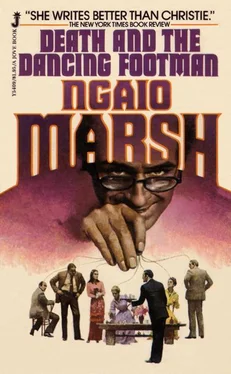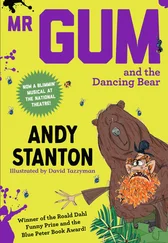Ngaio Marsh - Death And The Dancing Footman
Здесь есть возможность читать онлайн «Ngaio Marsh - Death And The Dancing Footman» — ознакомительный отрывок электронной книги совершенно бесплатно, а после прочтения отрывка купить полную версию. В некоторых случаях можно слушать аудио, скачать через торрент в формате fb2 и присутствует краткое содержание. Жанр: Классический детектив, на английском языке. Описание произведения, (предисловие) а так же отзывы посетителей доступны на портале библиотеки ЛибКат.
- Название:Death And The Dancing Footman
- Автор:
- Жанр:
- Год:неизвестен
- ISBN:нет данных
- Рейтинг книги:4 / 5. Голосов: 1
-
Избранное:Добавить в избранное
- Отзывы:
-
Ваша оценка:
- 80
- 1
- 2
- 3
- 4
- 5
Death And The Dancing Footman: краткое содержание, описание и аннотация
Предлагаем к чтению аннотацию, описание, краткое содержание или предисловие (зависит от того, что написал сам автор книги «Death And The Dancing Footman»). Если вы не нашли необходимую информацию о книге — напишите в комментариях, мы постараемся отыскать её.
Death And The Dancing Footman — читать онлайн ознакомительный отрывок
Ниже представлен текст книги, разбитый по страницам. Система сохранения места последней прочитанной страницы, позволяет с удобством читать онлайн бесплатно книгу «Death And The Dancing Footman», без необходимости каждый раз заново искать на чём Вы остановились. Поставьте закладку, и сможете в любой момент перейти на страницу, на которой закончили чтение.
Интервал:
Закладка:
“I?” said Chloris. “Why, I’ve thought a lot about it ever since Aubrey told me but I’m afraid I’ve no ideas at all. It might have been one of the maids, even, though I suppose that’s not very likely.”
“Did you notice these prints as you went down?”‘
“I’m not sure. I stood on the top of the terrace for a bit and noticed Aubrey’s and some other big footprints — William’s they must have been — and I thought I might walk dawn inside them, do you know? I’ve got a sort of feeling I did notice something out of the tail of my eye. I’ve got a sort of after-flavour of having fancied there must be someone else about but it’s much too vague to be useful. On the way back I was too concerned about Aubrey to notice.”
“Were you?” asked Mandrake with unmistakable fervour. Alleyn waited philosophically through an exchange of inaudible phrases, and remarked the air of complacency that characterizes persons who have arrived at a certain stage of mutual attraction.
“The smoking-room is on that side of the house, isn’t it?” he said at last.
“Yes,” agreed Chloris uncomfortably, “but so are the visitors’ rooms upstairs.”
“Do they overlook the lake and pavilion?”
“Madame Lisse’s room doesn’t,” said Mandrake. “I asked Jonathan that, and he said some tall evergreens on the bank would be in the way. I imagine they’d interrupt Mrs. Compline’s view too.”
“And you definitely connect these three strange events? You feel certain that the same person is behind all of them?”
“But — yes,” said Chloris blankly. “Of course we do. Don’t you?”
“It looks like it, certainly,” said Alleyn absently.
“Surely,” said Mandrake, acidly, “it would be too fantastic to suppose there has been more than one person planning elaborate deaths for Nicholas Compline during the weekend?”
“For Nicholas Compline?” Alleyn repeated. “Oh, yes. It would, wouldn’t it?”
“I assure you I had no enemies at Highfold. I’d never met a single one of the guests before.”
“Quite so,” said Alleyn mildly. “Going back still farther, we come to the first hint of trouble, the rather childish message on the Charter form which you say Dr. Hart handed to Nicholas Compline, together with a form that had been correctly filled in. ‘You are warned. Keep off.’ You say that there is no question of anyone else handing this paper to Compline.”
“No possibility of it. Nicholas simply took the paper from Hart,” said Mandrake, “and, on looking at it, found this second one underneath. Hart’s explanation was that he must have torn two papers off at once. Nicholas didn’t say, at the time, what was on the paper, but he was obviously very much upset and, later that evening, he told Jonathan he thought he ought to go. The following day, and good God it’s only yesterday, he actually tried to go and nearly drowned himself in a drift.”
“Yes. And that completes the skeleton.” Alleyn folded the notes and put them in his pocket. “As they used to say in Baker Street: ‘You are in possession of the facts.’ I’d like a little news about the people. You say that, with the exception of your host, you had met none of them before. That’s not counting Miss Wynne, of course.”
“Yes, it is,” said Chloris, and with an air of great demureness she added: “Aubrey and I are complete strangers.”
“I don’t suppose I shall know her if I meet her again.” Alleyn sighed as Mandrake once more removed his left hand from the driving-wheel. “He will resent everything I say to her,” thought Alleyn, “and she will adore his resentment. Blow!” However, he introduced the subject of motive, which Mandrake, in his notes, had dealt with illusively, unconsciously supposing the reader would be almost as familiar as himself with the relationships of the eight guests to each other and to their host. In a very short time Alleyn discovered that these two were quite ready to talk about Madam Lisse and Lady Hersey, about Mrs. Compline and Dr. Hart, and about William’s fury when he discovered that Hart was the author of his mother’s disfigurement. They were less ready to discuss in detail Hart’s enmity to Nicholas, though they never tired of stressing it. Hart had threatened Nicholas. Nicholas had goaded Hart until he completely lost control of himself. That was the burden of their song. It was on account of Nicholas’ attentions to Madame Lisse, they said. When Alleyn asked if Nicholas knew that Madame Lisse was Madame Hart, they said they hadn’t asked him, and Chloris added, with a new edge to her voice, that it was highly probable. Alleyn said mildly that it appeared that Nicholas had acted like a fool. “He seems to have baited Hart to the top of his bent and at the same time been rather frightened of him.”
“But that’s Nicholas all over,” said Chloris quickly. “It was exactly that. ‘The small boy tweaking the dog’s tail.’ That’s Nicholas.” Mandrake cut in rather hurriedly but Alleyn stopped him. “You know Compline well, Miss Wynne?” She took so long to answer that he was about to repeat the question, which he was certain she had heard, when without turning her head, she said: “Yes. Quite well. I was engaged to him. You’d better hear all about it, I suppose.”
“I can’t see…” Mandrake began, but this time it was Chloris who stopped him: “It hasn’t anything to do with it, I know, but I think Mr. Alleyn would rather see for himself.”
“An admirable conclusion,” said Alleyn lightly, and he heard without further comment the story of the two engagements. When she had finished, he made her a little speech, saying he was sorry under such tragic circumstances to be obliged to pester her with questions. Nothing could have been more uncomfortable than their reception of this simple offer of sympathy. Their silence was eloquent of embarrassment. Chloris did not turn her head and when Alleyn caught sight of Mandrake’s face in the driving glass it was scarlet and scowling.
“You needn’t bother,” said Chloris in a high voice. “I wasn’t in love with William. Didn’t you guess that? As I have already explained to Aubrey, I did it on the rebound from Nicholas.” In spite of herself, her voice lost composure and she ended up shakily: “That doesn’t say I’m not terribly sorry. I liked old Bill. I liked him tremendously.”
“I liked him too,” said Mandrake. “He was an oddity, wasn’t he?” Chloris nodded, and Alleyn thought that in making this unemphatic comment on William Compline, Mandrake had shown sureness of touch and a certain delicacy of understanding. He went on quietly: “He would have interested you, I believe, Alleyn. He was one of those people who speak a thing almost at the same time as they think it, and as he had a curious simplicity about him, some of the things he said were odd and disconcerting. He was quite like his brother to look at. The shape of his head—” Mandrake stumbled a little and then went on rather hurriedly. “From behind, as I explained in those notes, it was difficult to tell them apart. But they couldn’t have been more unalike in temperament, I should say.”
“And he painted?”
“Yes. I haven’t seen any of his works.”
“They were queer,” Chloris said. “You might like them, Aubrey. They might be quite your cup of tea, but most people thought his pictures too embarrassingly bad. I must say I always felt rather shy when I saw them. I never knew what to say.”
“What are they like?” asked Alleyn.
“Well, a bit as if a child had done them, but not quite like that.”
“ Very thick oil paint,” said Mandrake, under his breath.
“Why, have you seen one?” asked Chloris, in astonishment.
“No. He told me. He said it rather quaintly. If there was something childlike in his painting, it must have come from himself.”
Читать дальшеИнтервал:
Закладка:
Похожие книги на «Death And The Dancing Footman»
Представляем Вашему вниманию похожие книги на «Death And The Dancing Footman» списком для выбора. Мы отобрали схожую по названию и смыслу литературу в надежде предоставить читателям больше вариантов отыскать новые, интересные, ещё непрочитанные произведения.
Обсуждение, отзывы о книге «Death And The Dancing Footman» и просто собственные мнения читателей. Оставьте ваши комментарии, напишите, что Вы думаете о произведении, его смысле или главных героях. Укажите что конкретно понравилось, а что нет, и почему Вы так считаете.












